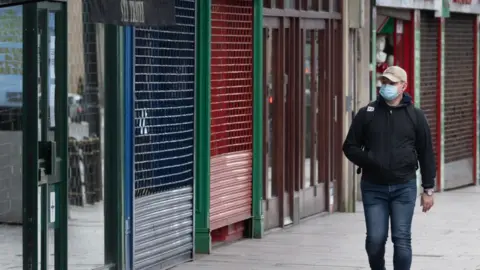The struggle to contain Covid-19's economic hit

 Getty Images
Getty ImagesThe worldwide economic impact of the coronavirus has been seismic and the job losses are starting to crash on the shores of the UK with increasing frequency and severity.
The 1,700 job losses at Airbus had a grim inevitability to them, given the destruction of demand in the aviation industry.
Demand for air travel in April and May was down more than 90% and normality is not expected to return for up to three years - maybe never for the more lucrative business class travel.
BA, Easyjet, Ryanair and Rolls Royce have already announced 20,000 job losses between them, so Airbus was never going to emerge unscathed.
The travel wipeout has seen SSP, the owner of stalwart transport hub tenants Upper Crust and Café Ritazza, cut 5,000 posts.
We already know that the number of workers on UK payrolls shrank more than 600,000 between March and May, according to the ONS.
That looks like the thin end of a very big wedge as the government's unprecedented job support scheme tapers off, with employers being asked to share the burden of the cost from the end of July to its withdrawal at the end of October.
Social fabric
The European head of a large investment bank told me this morning that one of their key concerns was the "fraying of the social fabric in the UK", thanks to a toxic cocktail of mass redundancies which will hit the low-wage jobs the UK has excelled in creating.
Employers are discovering that with increased use of technology, they can do many things with fewer people.
The march towards a more automated world has been accelerated by the virus - and the UK, with its high levels of employment in lower-skilled work, has further to fall compared to others, he said. The divide between the digital skills "haves" and "have-nots" will widen.
The chief economist of the Bank of England, Andy Haldane, has provided some relief to the gloom by saying the hit will not be as bad as expected and the recovery faster, but it's fair to say that his is not a mainstream view.
The reason the government has thrown tens of billions of pounds at trying to hold back the waves of unemployment is they realise that it does long-lasting damage to demand in the economy.
There is no doubt that the furlough scheme helped delay the impact, but this barrage of job cut announcements suggests the government is now struggling to turn the tide.
Boris Johnson described the virus as "still circling like a shark in our waters". It was an odd metaphor to use, considering the PM has previously praised the Mayor in Jaws for keeping the beaches open.
One thing seems certain: to combat the huge economic shock whose repercussions are being felt in airlines, factories and now High Streets, the government will need a bigger boat than the £5bn of previously announced spending accelerated yesterday.
The pressure is now on Captain Sunak.
